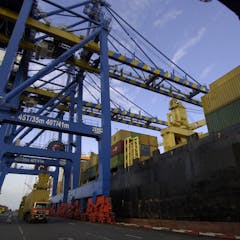
Articles on Manufacturing
Displaying 1 - 20 of 308 articles

Chinese businesses can help build an economy like Botswana’s, with the right government policies.

For a more nuanced view, dig beneath the numbers that make the news.

One common oversimplification is that it’s just about countries making and trading what they’re best at. Yes, but there’s a bit more to it.

Power outages in South Africa pose a threat to employment.

Expanding the $22.7 billion Future Made in Australia program would enhance the country’s economic resilience and competitiveness.

Australia has all the key ingredients to build a booming battery industry. We just need to find the right cooks and co-ordinate all of this frantic activity to get this big opportunity right.

The UK is now the world’s fourth largest exporter – but there’s more to the figures than meets the eye.

What’s in the budget for the environment? Lots for green industry, little for conservation

The UK has jumped up the global exports table, overtaking France, Japan and the Netherlands.

Ballooning inventories are to blame for much of the fashion’s sector carbon footprint. Could on-demand production solve such problems?

The policy will see Australia join the great ‘geoeconomic game’ reshaping international supply chains. But it won’t be without new risks for doing business.

What would it mean to bring solar manufacturing back on shore in Australia?

Global semiconductor manufacturing is already under geopolitical stress, but climate change ups the ante.

In an era of transformation, manufacturing still matters.

The effects of AI’s growth on global security could be difficult to predict.

India needs to follow a path akin to China’s to find answers to its job woes.

Boeing is under increased public and government scrutiny in the wake of dangerous events that have people worried about the safety of air travel.

The policy is the latest strategy to grow Ghana’s weak industrial base.

Smart water management isn’t just good for the earth. It’s good for business.

The popularity of unconventional luxury brand collaborations with young adult Chinese consumers opens potential opportunities for local producers of high end goods.

